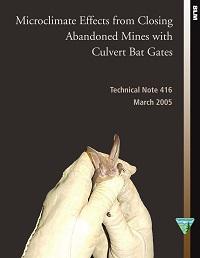Microclimate Effects from Closing Abandoned Mines with Culvert Bat Gates

Numerous bat species, including some threatened species, inhabit thousands of abandoned mines across the United States. Some of their bat habitat has been lost as mines are closed to reduce hazards to the public. Bat gates have been used to close some mines because they restrict public access while still allowing the bats to fly in and out. However, they are not appropriate for mines with trench portals. The Bureau of Land Management (BLM) proposed using culverts in the trenches and closing the culverts with bat gates. BLM worked with the Colorado School of Mines (CSM) to study the effects of this type of closure on the microclimate of the mines, which in turn could affect bats’ fidelity to the habitat. CSM developed a process that integrated continuous climate measurements with data from a computer model and tested it at three abandoned uranium mines in southwestern Colorado. Measurements were taken for 1 year prior to and 1 year after closing the mines with culvert gates. The results showed that the culvert gate closure slightly modified the microclimate by essentially extending the length of the mine, but indicated that bats should be able to locate the same climatic conditions a few feet away from their original roosting locations. The computer model predictions compared favorably with the measurements, and the model provided relevant insight regarding the qualitative trends reflected by the field measurements.
